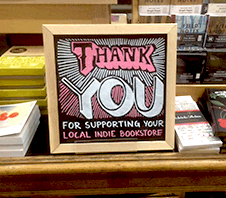- MEMBERSHIP
- Join
- Renew
- About Membership
- Membership Types
- Benefits Chart
- Dues Information
- Opening a Bookstore
- Member Directory
 From studies that demonstrate the economic impact of independent retailers to the powerful message of the IndieBound movement and networking with like-minded organizations, ABA is working to strengthen awareness about the crucial role independent retailers play in local economies and communities.
From studies that demonstrate the economic impact of independent retailers to the powerful message of the IndieBound movement and networking with like-minded organizations, ABA is working to strengthen awareness about the crucial role independent retailers play in local economies and communities.
Since 2002, a number of studies have repeatedly documented the positive economic impact of locally owned businesses, and their significantly greater economic return to the local economy than that of retail chains, big box stores, and, especially regarding sales tax, remote online retailers. Independent booksellers have often been the driving force behind these efforts, which have resulted in favorable public policy for indies and heightened consumer awareness of the issues.
A new report from ABA and Civic Economics reveals the continuing — and increasing — loss of jobs and essential state and municipal revenue as a result of the growing retail dominance of Amazon.com. The report documents both Amazon’s sales and, for the first time, the explosive growth of sales through its third-party Marketplace from 2014 to 2016. And the report makes clear that Amazon’s sales tax avoidance strategy has continued despite well-publicized agreements with American states.
A study from Civic Economics which details the overall negative impact that Amazon has had on Main Street retailers and jobs, and the communities in which they are located, across the country. ABA has prepared the New Localism Toolkit with resources for member bookstores based on data from the Amazon study.
A national survey of independent business owners conducted by the Institute for Local Self-Reliance in partnership with the Advocates for Independent Business coalition has found that Local First initiatives are boosting customer traffic and improving the outlook on Main Street, but policymakers need to do more to create a level playing field and ensure that small local businesses have an equal opportunity to compete.
The 2013 post-holiday Independent Business Survey, conducted by the Institute for Local Self-Reliance (ILSR) in partnership with the American Booksellers Association and other indie business organizations, has found that independent businesses experienced solid revenue growth in 2012, buoyed in part by “buy local first” initiatives and growing public interest in supporting locally owned businesses.
Communities as different as Las Vegas, New Mexico, and Louisville, Kentucky, have at least one thing in common: Their independent businesses recirculate a substantially greater proportion of their revenues back into the local economy than do their chain competitors. This, according to a national study, The Indie Impact Study Series: National Summary Report, a summary of 10 localized studies conducted by Civic Economics.
Once again, a national survey has demonstrated the power indie businesses -- and of an active "Buy Local" or "Think Local Campaign." A survey of more than 1,800 indie businesses found that holiday sales for independent retailers were up an average of 2.2 percent, in contrast to figures showing that overall retail sales were down 0.3 percent in December 2009.
A survey conducted by the Institute for Local Self-Reliance shows that indies outperformed chains over Holiday 2008, and indies in cities with active Shop Local campaigns did even better.
A new study from Local First of Grand Rapids, Michigan, reveals that a modest change in consumer behavior -- a 10 percent shift in market share to independent businesses from chain stores -- would result in 1,600 new jobs, $53 million in wages, and a $137 million economic impact to the area.
The San Francisco Retail Diversity Study (2007)
Civic Economics conducted this study on the health, diversity, and economic impact of independent merchants in San Francisco for the San Francisco Locally Owned Merchants Alliance, with oversight by the Northern California Independent Booksellers Association.
A 2004 report by Civic Economics, which compares 10 local businesses in the Andersonville neighborhood of Chicago versus their chain competitors, demonstrates the greater economic impact of locally owned businesses.
December 2002 report, prepared for Liveable City by Civic Economics, assessing the impact of local merchants, specifically Austin, Texas’ BookPeople and Waterloo Records, relative to the impact of chain stores.
American Booksellers Association is a national trade association that supports and advocates for the success of independent bookstores. We provide members with education, networking opportunities, advocacy, resources, and technology. In turn our members support local schools through book fairs, donations and author visits; promote literacy; provide inclusive community centers; connect readers and books; add character to neighborhoods; champion and center diverse and new voices; and contribute to the local economy. We feel honored to support them in their work.
PRESS INQUIRIES: [email protected]
INDIECOMMERCE: [email protected]
ALL OTHER INQUIRIES: [email protected]
Copyright 2025 American Booksellers Association. BookWeb is a registered trademark of ABA.
Privacy Policy, Cookie Policy, Accessibility Statement